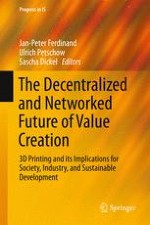2016 | OriginalPaper | Buchkapitel
Can Open Source Hardware Disrupt Manufacturing Industries? The Role of Platforms and Trust in the Rise of 3D Printing
verfasst von : Sebastian Spaeth, Piet Hausberg
Erschienen in: The Decentralized and Networked Future of Value Creation
Aktivieren Sie unsere intelligente Suche, um passende Fachinhalte oder Patente zu finden.
Wählen Sie Textabschnitte aus um mit Künstlicher Intelligenz passenden Patente zu finden. powered by
Markieren Sie Textabschnitte, um KI-gestützt weitere passende Inhalte zu finden. powered by
